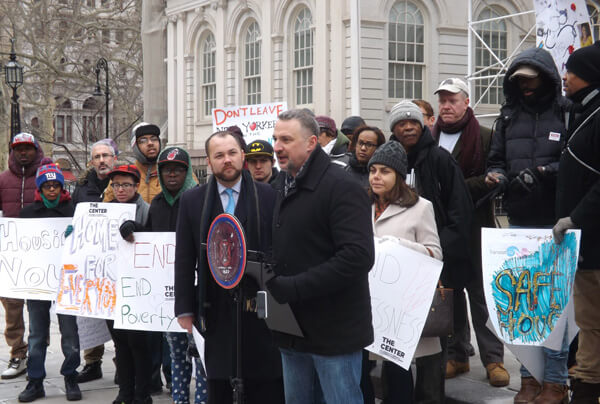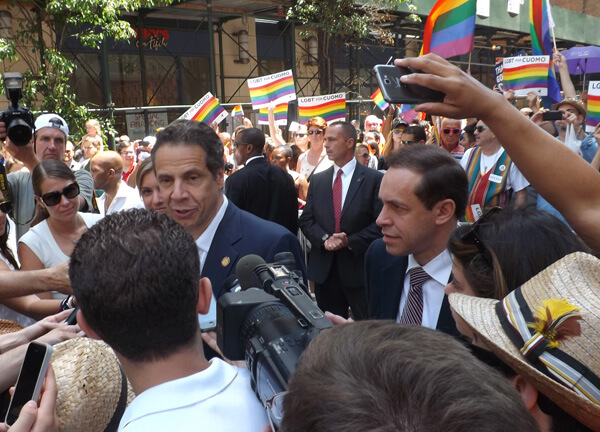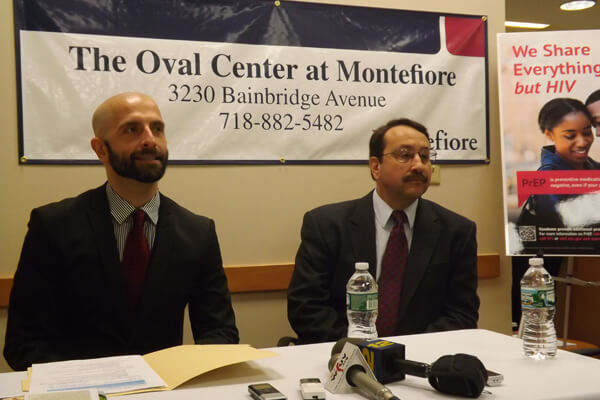COVER ILLUSTRATION BY MICHAEL SHIREY
Even 23 years after Ed Koch’s departure from public office, journalists and commentators struggled over the past 10 days to neatly summarize and assess his 12 years at the helm of New York City government.
Many written accounts chose to highlight, in either laudatory or nostalgic tones — or both — the frequent colorful moments in the career of a brash and at times omnipresent mayor.
The most substantive praise for Koch came regarding his success in creating or rehabbing several hundred thousand units of affordable housing. He was credited, in far less specific terms, for bringing New York back from the mid-‘70s brink of bankruptcy — surely a vast oversimplification of a very complicated story. Many even cited his co-sponsorship, as a House member from Manhattan, of the earliest gay rights measure in Congress.
Only the last of these factors, however, was relevant to the specific job Gay City News faced in recounting and contextualizing the legacy of Ed Koch.
What was the impact of his continued closetedness as a gay man on his performance on LGBT and AIDS issues?
In a pair of stories in this issue, Andy Humm and Duncan Osborne do what almost no other journalist could — they offer smart, well reported, and appropriately detailed accounts of Koch’s LGBT and AIDS records informed by a sophisticated knowledge and understanding of the gay community’s history in New York over the past 30 years.
In the process, three principal questions emerge. How well did Koch follow up on his early progressivism on gay rights as mayor? How adequate was his response to AIDS and where and why did he fail? And, finally, what was the impact of his continued closetedness as a gay man on his performance on LGBT and AIDS issues?
It is that last question, of course, that has proved hardest to engage an intelligent and honest conversation about. For the most part, mainstream journalists deftly finesse the question — even when discussing at length the widespread speculation about Koch’s sexuality — by keeping grammatical constructions safely in the hypothetical. Noting that he was “a bachelor,” the New York Times wrote, “Perhaps inevitably there were rumors, some promoted by his enemies, that he was gay. But no proof was offered…” The Times almost sounds as though it were facing the sort of cultural unknowables encountered by anthropologist Margaret Mead in some far-off Stone Age culture when it writes about lack of “proof.”
Humm, in his piece, cites two named sources — one a longtime political leader in the gay community, David Rothenberg, who knew Koch and his lover of the time, Richard Nathan, in the 1970s, and the other a deceased executive director of the city’s leading Latino AIDS organization, Dennis deLeon, who found himself the object of the then-mayor’s romantic hopes. Just as telling, a longtime Koch friend, journalist and author Charles Kaiser, without doubt the late mayor’s most ardent defender in the gay community, told Humm, “It would have been a magnificent thing if Koch had come out of the closet at the height of the [AIDS] crisis.”
Mainstream journalists demonstrate a confounding reluctance to accept this sort of “proof” when it comes to the unacknowledged homosexuality of a public figure — a reticence found almost nowhere else in our media culture. Even the generally fearless Wayne Barrett, writing in his 2001 book “Rudy!” about the simultaneous efforts of AIDS activists Larry Kramer and Rodger McFarlane and then US Attorney Rudolph Giuliani to get to the bottom of Koch’s sexuality, just won’t go there… Despite the fact Koch’s evident panic, painstakingly chronicled by Barrett, over the threat that Nathan might return from California to out him could only make sense if there had in fact been a romantic relationship.
Once the conversation moves around to the inevitable conclusion that Koch was gay, a new line of defense against talking about it emerges: Why is that relevant? Did it really impact any policy or governing choices he made? Wasn’t he, after all, an early supporter of gay rights? He doesn’t belong in that group of closeted politicians who have hypocritically harmed the LGBT community, does he?
For me, there is no easy, definitive answer to the question of how the closet affected Koch’s public life. Thanks to Humm and Osborne, this much we know:
Along with Bella Abzug, another Manhattan House Democrat, Koch was at the forefront of the effort to introduce a federal gay civil rights law — one far bolder and broader, in fact, than the proposed Employment Non-Discrimination Act currently under consideration.
Widespread questions about his sexuality emerged as early as his 1977 run for mayor, when signs popped up in Queens reading “Vote for Cuomo, Not the Homo” — a scarring experience that haunted the former mayor more than 30 years later, as evidenced by a video interview with the Times released when he died. In that same campaign, Koch often appeared on the stump with former Miss America Bess Myerson in a way calculated to invite speculation about a romance.
Despite his commitment to enact a city gay rights law, the mayor-elect in the final months of 1977 scuttled efforts by outgoing Mayor Abe Beame to push the bill over the finish line. Six months after telling advocates the measure would be a lay-up, Koch was castigating them for their impatience. Despite frequent appearances to testify on behalf of the bill, the mayor hid behind the intransigence of the City Council majority leader in justifying why it took another nine years to get the job done.
A year or so before the gay rights law’s enactment, Koch remained mute as Cardinal John O’Connor, standing next to him at a press conference, warned that enforcing a nondiscrimination policy on city contractors would force Catholic charitable organizations to expose the youth they work with to homosexual men.
On AIDS, the mayor held activists at arm’s length for nearly two years, declined to explore public housing opportunities or other targeted benefits for those critically ill from the HIV virus, ignored his health commissioner’s warning that needle exchange was needed to stave off thousands of infections, and simultaneously minimized the scope of the epidemic and exaggerated the resources the city was devoting to combat it — particularly as he made misleading comparisons to what was being done in San Francisco. In the face of a public health emergency of unprecedented proportions, Koch dithered.
Activists Allen Roskoff and Larry Kramer argue that his actions cannot be understood separate from his closetedness. In their view, his self-loathing had calamitous ramifications.
Osborne’s story suggests that his administration’s lethal caution was based on more prosaic political calculations related to fear of creating costly new municipal entitlements and spawning political backlash from voters anxious not to return to the profligate ‘60s and ‘70s. Several years before his 2009 death, Rodger McFarlane made a similar argument to me. After the city’s long decline under his predecessors, Koch believed he had enabled New York to declare itself open for business again, McFarlane said. AIDS was an inconvenient truth that ran counter to that narrative.
It is also undeniable that Koch’s political base shifted radically between his time in Congress and his victory in the 1977 mayor’s race. Manhattan liberalism was no longer his brand. Instead, he perfected the vernacular and gut instincts of the outer boroughs.
How all these factors came together in shaping Koch’s dozen years in City Hall is difficult to pin down with absolute confidence. Had he come out, of course, the archbishop of New York would never have dared hurl the most vile of blood libels at the gay community. Koch’s nearly perverse inability to have a constructive dialogue with gay and AIDS activists in the early years of the epidemic was almost certainly conditioned by his discomfort with a community that increasingly believed that if you were gay and in public life you should say so. And only by detaching himself from his gay identity could he remain so publicly combative in response to the human tragedy unfolding around him.
In time, we may know more to help us better sort out and pin down Ed Koch’s difficult legacy. One thing is for certain, though. If in 2016, the US economy has improved so that Americans feel better about their futures, but joblessness remains rampant in Harlem and Bed-Stuy and on Chicago’s South Side and in LA’s Watts, no journalist would think twice about pursuing a story examining whether the first African-American president had failed his black constituents and if fatal caution was to blame.


































